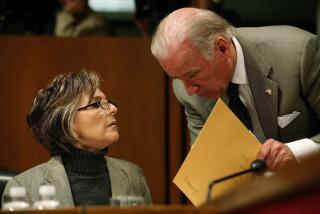Feinstein, Boxer Represent 2 Blocs Needed by Clinton
- Share via
WASHINGTON — Two days after taking an oath of impartiality last week, Sen. Barbara Boxer whooped it up with President Clinton at an intimate 60th birthday party for her husband, Stewart.
Days later, Sen. Dianne Feinstein shared a table with First Lady Hillary Rodham Clinton at a White House state dinner, where the impeached president tangoed the night away.
After a months-long display of outrage, dismay, hand-wringing and denunciation of a man whose personal conduct they have called “abhorrent,” California’s senators--like their 43 Democratic colleagues--have cooled off and calmed down. They apparently have forgiven and are almost ready to forget what some saw as a personal betrayal so egregious that, in Feinstein’s case, she even refused to take his calls.
Now, with the impeachment trial underway, these Senate Democrats stand as Clinton’s last line of defense. And in a show of party solidarity that is every bit as choreographed as the president’s late-night dance, not a single one of them, as yet, has broken ranks.
“Sometime last year it dawned on a lot of Democrats that it was in their own self-interest for him to survive,” said Charles Cook, an independent Washington political analyst. “Had he gone into a political free-fall, he probably would have taken a lot of them with him.”
Still, closer inspection reveals a distinction between Democrats who are unquestioningly pro-Clinton and those, more conflicted, who have seared the president publicly. California’s senators are emblematic of those two factions: Boxer among the dependable partisans who could be counted on to back the president come hell or high water, Feinstein one of the more independent Democrats, deeply troubled by his behavior and not always predictable when it comes to toeing the party line.
Clinton needs desperately for both these blocs to hold fast behind him if he is to finish the remaining two years of his presidency. (Said one Senate observer of Feinstein’s presence at the state dinner: “He’s working on her. Believe me, she doesn’t like to tango.”)
While Feinstein and Boxer now seem to be in the same place, they traveled markedly different roads to get there.
Boxer Branded a Hypocrite
For Boxer, Clinton’s misdeeds made a grueling reelection fight last year all the tougher. A vocal critic of former Sen. Bob Packwood (R-Ore.) when charges of sexual harassment surfaced against him a few years ago, she was branded a hypocrite for failing to blister Clinton when his affair with a White House intern was revealed.
As a sort-of relative to the president--her daughter married Mrs. Clinton’s brother--Boxer’s fitness to serve as a Senate juror was challenged by critics who said that she could not be impartial, a question that dogs her still. Quizzed about it on Cable News Network an hour before the trial opened Thursday, she basically changed the subject.
“The Founding Fathers decided to give power to senators” to decide if a president should be removed from office, she said. “They wanted it to be political. . . . All senators know the president. We all have an opinion.”
Though Boxer never distanced herself from Clinton--in fact, he campaigned vigorously for her--she spent almost all of last year avoiding weekend talk shows.
Now comfortably installed for another six-year term, Boxer spent her first weekend of the new session in Washington defending Clinton. She came out slugging on “Meet the Press” and was still throwing televised blows Thursday after learning that some Republican senators had secretly met with members of the House impeachment team to discuss the unsettled subject of calling witnesses.
“There’s a great sadness in the Democratic Caucus today,” she fumed. “We were so happy that we had reached this bipartisan consensus and now, we think, that’s all being broken apart.”
Feinstein, by contrast, never has been threatened politically by the White House debacle, even as she heads toward a 2000 reelection bid. For her, Clinton’s conduct was more of a personal affront. She sat just feet from him when he stared into television cameras last January and made his now-famed finger-wagging denial of an affair with former White House intern Monica S. Lewinsky. Months later, after Clinton acknowledged the “inappropriate relationship,” she charged to the Senate floor as one of the first Democrats to upbraid him, saying that her confidence in him had been “shattered.”
But in an interview this week, Feinstein said that time has helped her forgive the president. After careful evaluation of the history of impeachment, the motives of Clinton’s accusers and the opinion of an electorate that has seen the evidence and still endorses him, Feinstein leans toward acquittal.
Feinstein Notes Support of People
“The American people have weighed in with a view that they may have questions about him personally, but they still believe he’s a good president,” she said.
“The partisanship has impacted me, no question about that. It is very difficult for me to separate this from four years of what has been constant investigation, all very partisan,” Feinstein added.
On Thursday morning, she spent a half-hour on the treadmill before taking her seat on the Senate floor, carrying a white binder filled with impeachment legalese. While insisting that she begins the trial with an open mind, Feinstein sounded remarkably charitable toward a president whose lying once had her so worked up that her staff insisted she get a good night’s sleep before making any public statements about him.
Today, she defends him against the criticism that he has been less than loyal to Democratic lawmakers.
“This is a man who came out and helped me in my reelection [in 1994],” Feinstein said. “I had my 60th birthday party in the White House. . . . I don’t know any president in recent history who has done more fund-raising for individual Democrats than he has.”
As Feinstein’s comments illustrate, the solidarity among Senate Democrats may be as much an effort to protect their party as to save its chief standard-bearer.
“You turn on the president and you are really going to hurt the party,” said Stuart Rothenberg, a Washington-based political analyst. “It would be clear that the Democrats are in disarray. The American public will lose confidence in the whole party and individual senators will suffer. The soldiers . . . stay behind the general because the general is going to decide whether your message succeeds.”
Times staff writers Mark Z. Barabak, Geraldine Baum and Judy Lin contributed to this story.
More to Read
Get the L.A. Times Politics newsletter
Deeply reported insights into legislation, politics and policy from Sacramento, Washington and beyond. In your inbox twice per week.
You may occasionally receive promotional content from the Los Angeles Times.








